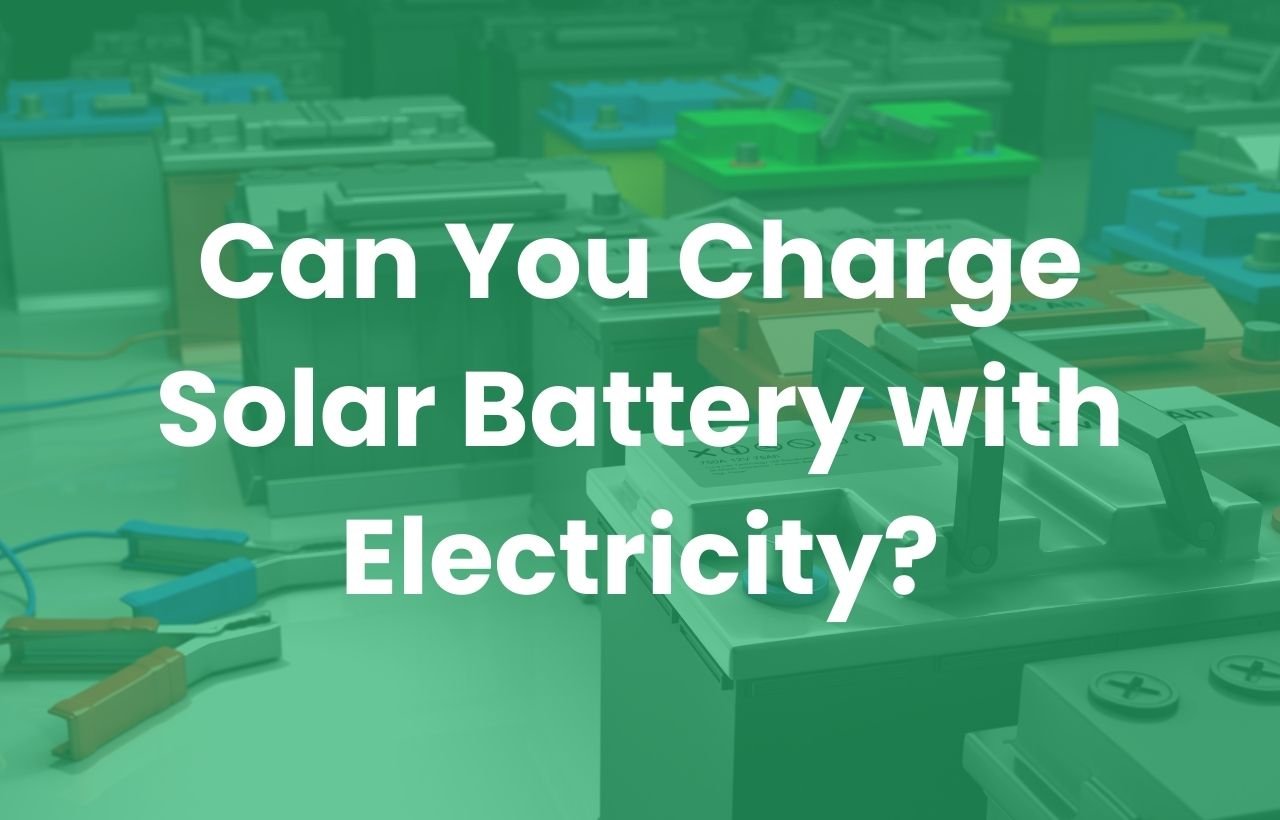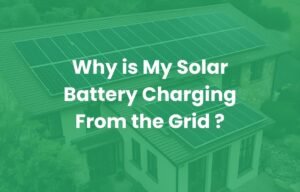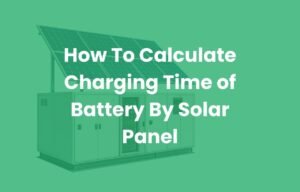A big step toward energy sustainability is purchasing a solar battery. However, it naturally raises significant concerns of adaptation and security, particularly in the absence of sunlight.
The lack of sunlight in various situations raises the most common question people ask: “Can you charge solar battery with electricity?”
The answer to this question helps you to maximize your investment in solar energy storage. This is not just about keeping your lights working during an outage.
It’s about efficient energy management, possible cost savings, and total control over your home’s power supply
In this article, we will discuss the clear answer to the question “Can you charge solar battery with electricity?”. Explain how it works, why you should do this, the equipment that you need to know about, and the limitations and drawbacks that come with it.
Table of Contents
ToggleHow does this charging procedure work? (Simple explanation)
A smart inverter controls a system that includes solar batteries. The component referred to as a hybrid inverter or inverter/charger is essential for electrical charging.
This is a simple explanation of the procedure:
-
Standard Solar Charging:
Solar panels produce DC electricity when it’s sunny. For instance, in your house, the inverter transforms it into AC power. The inverter then transforms any extra energy back into DC so that it can be stored in the battery.
-
Grid Charging Protocol:
The hybrid inverter permits alternating current (AC) power from your utility provider to reach the battery when grid charging is started.
This grid AC electricity is then converted by an internal charger into the exact direct current (DC) voltage needed to safely and effectively charge the battery.
Usually, your system’s software handles this entire process automatically using preset options that you or your installer have selected.
Can You Charge Solar Battery with Electricity?
Yes, it is absolutely possible to use electricity to charge solar battery.
The majority of current home energy systems are designed to have this functionality. It is designed to give homeowners maximum adaptability by making sure that a lack of sunlight does not result in a power outage.
Your solar battery becomes a reliable, multifunctional energy management system that can meet your needs in every weather condition when it is charged using electricity.
Why Would You Charge a Battery with Grid Electricity?
While it may appear to go against the objective of energy independence, using grid power to charge a solar battery has some very useful benefits:
-
Backup Preparation for Bad Weather:
The main reason. You might not have fully charged your battery after a few overcast days. Your battery will be fully charged and prepared to power your house in the event of an outage, such as a storm, if you manually start an electrical charge.
-
Time-of-Use (TOU) Rate Optimization:
Many utilities have higher rates between “peak” hours (four to nine o’clock, for example). Your electricity rates can be greatly decreased by setting your system to use cheaper electricity to charge the battery during “off-peak” hours (such as nighttime) and use that stored energy during expensive peak times.
-
Limited Solar Production:
For households with roof space restrictions that prevent the installation of solar panels, it may still be more cost-effective to charge a battery using off-peak electrical supply instead of using the electricity supply directly during high-rate times.
Essential Equipment for Grid Charging
Not every solar-plus-storage system is able to get power from the grid. To use this feature, you will require:
-
A Compatible Battery:
Many new household batteries are ready to accept a grid charge, which is a benefit. Brands including the Tesla Powerwall, LG Chem RESU, Enphase IQ Battery, and Generac PWRcell are available for purchase. Make sure grid-charging is part of the item’s features to prevent expensive surprises later.
-
A Hybrid Inverter:
The main part of the operation is a hybrid inverter. Three energy sources can be intelligently managed by a hybrid inverter: the electrical grid, the battery, and solar panels. It manages the AC to DC power conversions required for cycles of charging and discharging.
-
Expert Installation and Configuration:
Only a trained professional may install and configure the system. This guarantees that it functions effectively, safely, and follows the local utility company regulations.
Important Factors and Potential Drawbacks
Grid charging is a useful feature, however it’s necessary to understand its drawbacks and consequences:
-
Utility Company Regulations:
There may be certain guidelines set up by your local utility company about when and how you charge a battery from the grid. To avoid placing an excessive amount of pressure on the local grid system, some might be restricted. You should always ask your installer about these rules.
-
You Pay for the Electricity:
Electricity from the grid isn’t free. To achieve normal financial savings, the plan is to use it carefully, together with in the course of off-peak hours, in place of charging the battery randomly at any time.
-
Efficiency Losses:
The efficiency of energy conversion is not 100%. When switching grid electricity from AC to DC for the battery (and back to AC for your home), there are small losses. There is still no more effective way than direct solar charging.
-
Battery Longevity:
Though they are designed for many uses, modern batteries may not last as long if they are continuously charged at the grid’s maximum rate. Instructions from the manufacturer must be followed properly.
Conclusion:
Asking “Can you charge a solar battery with electricity?” eventually provides a helpful feature that improves your system’s stability and adaptability.
Through smart time-of-use rate control, it unlocks huge savings and offers a vital safety net during prolonged bad weather.
Are you prepared to create a more efficient and secure home energy system? Contact a certified installation right now to find out how to benefit from the potential of using power to charge a solar battery for your house.




